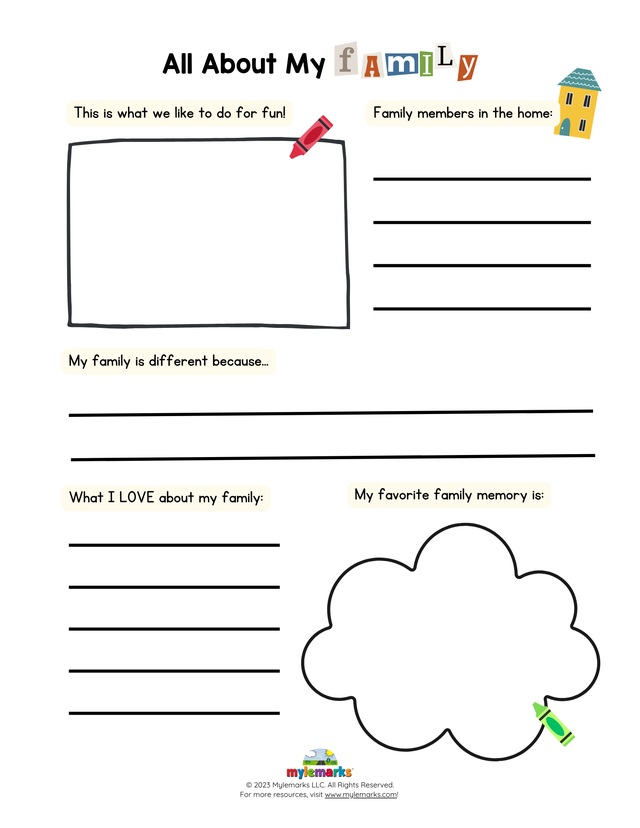- the mylemarker
- Posts
- 🎭 Adolescence, a freebie, and more
🎭 Adolescence, a freebie, and more
Take a closer look at Netflix’s hit show Adolescence, grab your freebie, and stay informed on the latest social-emotional insights for kids and teens.
THE ROAD MAP
In this newsletter, you’ll find:
🚦 First Stop (Adolescence on Netflix)
🛤️ Site-seeing at mylemarks.com (FREEBIE: Asking for Help)
📡 On the Radar (The Strongest Heart, Family Size, and more)
📅 Mark Your Calendars
🤗 Sharing is Caring (spread the mylemarker love and earn)
Let’s go!

FIRST STOP
🎭 Adolescence on Netflix: A Chilling Look at Toxic Masculinity and Online Influence

Netflix’s new limited series, Adolescence, is sparking conversations about toxic masculinity, online radicalization, and the emotional isolation of teen boys. The four-part drama follows 13-year-old Jamie Miller, who is arrested for the murder of a classmate. As the story unfolds, viewers learn that Jamie was influenced by misogynistic online spaces. Co-writer Jack Thorne refers to these spaces as the “manosphere”, incel forums and male-dominated internet subcultures.
“There is a need for a conversation about boys and about girls, about the harm being done to girls, and about the implicit violence that's happening in coded conversations.”
Through emotionally intense episodes and symbolism-packed social media interactions, the show depicts how teens use emojis with hidden meanings, such as the red pill to signal incel ideology. Clinical experts say this reflects real-life challenges: Teens struggling with identity, isolation, and emotional dysregulation often turn to toxic online communities in search of connection. According to Dr. Caroline Fenkel of Charlie Health, adolescent boys are especially vulnerable due to shifting circadian rhythms, a heightened need for risk-taking, and a lack of emotional outlets.
Adolescence can be a conversation starter for boys wrestling with loneliness, anger, or confusion about gender roles and relationships. It is essential to explore how platforms like Reddit, YouTube, and Discord shape boys’ sense of identity and how media literacy and emotional regulation skills can offer healthier alternatives. The show also reminds adults that understanding teen culture means engaging with the symbols, language, and platforms they use.
SITE-SEEING at mylemarks.com
FREEBIE: Asking for Help
This printable worksheet provides kids with simple, supportive phrases to use when they’re feeling overwhelmed, sad, or unsure of how to reach out. With nine different sentence starters like "I’m having a rough day, can I talk to you?" and "I need a break—can you help me calm down?", it helps normalize asking for help and builds emotional communication skills. This tool is perfect for empowering children to express their needs and advocate for themselves during tough moments.

Putting it in Action
Tips for using Asking for Help with clients.
Role-play the phrases: Practice different emotional scenarios where the child can use the phrases with you as the “listener,” then reverse roles to reinforce empathy and understanding.
Send home as a visual support: Encourage caregivers to hang it on the fridge or inside a journal so children have a go-to reminder of how to speak up when struggling.
Create a personalized “help script”: Let clients circle the phrases that feel most natural, and then write their own version using their voice and language.
Pair with coping tools: Use the worksheet before introducing other regulation strategies, like deep breathing or journaling, to show how asking for help can be the first step.
ON THE RADAR
💔 The Strongest Heart: Navigating Family, Mental Illness, & Survival
Saadia Faruqi’s The Strongest Heart is a moving young adult novel about Mo, a Pakistani American teen coping with his father’s schizophrenia. The story draws heavily from Faruqi’s own experiences growing up in Pakistan with an undiagnosed and untreated parent. Through Mo’s eyes, readers witness the confusion, shame, and longing for stability that can come with living in a household affected by mental illness. The book also includes empowering side characters and South Asian folktales that offer warmth and resilience. This is an excellent recommendation for young clients dealing with family instability or emotional neglect.
🏡 Why Family Size Matters
A new World Happiness Report highlights that household size significantly impacts well-being, with four to five members being the “sweet spot” for connection and life satisfaction. While smaller households often report higher economic contentment, they tend to score lower on relational support and emotional well-being. In contrast, mid-sized households provide a natural support system and opportunities to share responsibilities — critical for resilience and mental health. But the key isn’t just numbers — it’s quality: positive emotional exchanges, communication, and mutual support are what matter most. This offers insight into how household dynamics shape children’s and families’ well-being — and how to strengthen those dynamics across any family size.
🧬 NIH Cuts LGBTQ+ Mental Health Grants
The NIH has recently terminated multiple grants related to LGBTQ+ health and DEI research, raising serious concerns about the politicization of science. Among the canceled projects is a study examining the impact of discriminatory legislation on LGBTQ+ teens' mental health. Dr. Brittany Charlton, whose work was defunded, called the terminations “unprecedented and deeply concerning.” Experts warn that the move could widen mental health disparities for LGBTQ+ youth and hinder vital research on suicide prevention and social-emotional well-being. With fewer federal dollars going toward these topics, therapists and educators may find themselves with shrinking access to data and tools to support this vulnerable population.
MARK YOUR CALENDARS
Here are some upcoming dates you should know!
APRIL
National Autism Awareness Month – Focuses on increasing understanding and acceptance of individuals with autism
Stress Awareness Month – Highlights the impact of stress on health and promotes coping strategies.
Counseling Awareness Month – Recognizes the importance of professional counseling for mental wellness.
National Child Abuse Prevention Month – Raises awareness of child abuse and how to prevent it.
National Library Week (April 6–12, 2025) – Celebrates libraries, reading, and lifelong learning. Learn more
Worksheets | Activities | Workbooks | Journals | Games | Videos | Freebies


